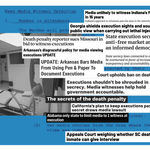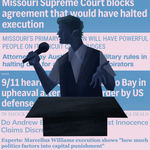Entries by Leah Roemer
News
Jan 14, 2025
New Analysis: Marion Bowman’s Scheduled Execution in South Carolina Raises Concerns About Youth Culpability, Fits Pattern of Disproportionate Executions of Young Black Men
When Marion Bowman was arrested at age 20 for the murder of Kandee Martin, society did not consider him mature enough to drink alcohol, rent a car, or enter a casino. Yet he was deemed old enough to be sentenced to death. Now 44, he has spent over half his life on South Carolina’s death row and is scheduled for execution on January 31. “Retribution is not proportional if the law’s most severe penalty is imposed on one whose culpability or blameworthiness is diminished, to a substantial degree…
Read MoreNews
Jan 07, 2025
Aaron Gunches Asks for February Execution Date, Raising New Concerns About Arizona’s Lethal Injection Protocol and the Execution of “Volunteers”
No jury has ever learned about Aaron Gunches’ life history and experiences, nothing about his childhood, mental and physical health, or trauma — the mitigation evidence that the Supreme Court has said is essential to a constitutional death sentence. Arizona courts judged Mr. Gunches competent to represent himself in two separate trials for the murder of his ex-girlfriend’s husband, and he presented no defense in either proceeding. Jurors twice sentenced him…
Read MoreNews
Dec 17, 2024
Indiana’s First Execution in 15 Years Raises Serious Constitutional Concerns
If Joseph Corcoran had been sentenced to death just a few miles to the east, across the border in Ohio instead of in Fort Wayne, Indiana, it’s likely that a court would have barred his execution. Ohio law prevents a person with a serious mental illness (SMI) at the time of their crime, defined as schizophrenia, schizoaffective disorder, bipolar disorder, or delusional disorder, from being put to death. Mr. Corcoran, who has a long history of paranoid…
Read MoreNews
Dec 05, 2024
Hidden Casualties: Executions Harm Mental Health of Prison Staff
In March, Oklahoma officials asked the state’s high court to increase the time between executions from 60 to 90 days, citing the“lasting trauma” and“psychological toll” of executions on corrections officers. But Judge Gary Lumpkin dismissed these concerns, telling officials that prison staff needed to“suck it up” and“man up.” A few weeks later, Brian Dorsey was executed in Missouri after the governor ignored the pleas of an unprecedented 72 corrections…
Read MoreNews
Nov 22, 2024
New Resource: In Era of Secrecy, States Increasingly Restrict Media Access to Executions
On December 18, Joseph Corcoran is scheduled to be the first person executed by Indiana officials in 15 years. For the first time, the state will use a single drug, pentobarbital, which comes from an unknown source and has been known to cause prisoners“excruciating” pain during executions. But no media witnesses will be present to relay what happens to the public. Indiana is an outlier in its policy decision to completely exclude the press from witnessing…
Read MoreNews
Nov 07, 2024
Idaho: Federal Judge Grants Stay of Execution for Thomas Creech; Defense Asks Court to Bar Death Penalty for Bryan Kohberger
Thomas Creech and…
Read MoreNews
Oct 24, 2024
New Analysis: Death-Sentenced Prisoners “Volunteer” for Execution at Ten Times Civilian Suicide Rate
Derrick Dearman first told his mother that he wanted to die when he was four years old. On October 17, he was executed by the state of Alabama, becoming the 20th person executed in the United States this year and the 165th in the modern era to“volunteer” for death. A new analysis by the Death Penalty Information Center shows that despite falling rates of death sentences, executions, and public support for the death penalty, the number of death-sentenced prisoners…
Read MoreNews
Oct 18, 2024
Discussions with DPIC Podcast: Professor Steve Vladeck on the Supreme Court’s Death Penalty Shift
Professor…
Read MoreNews
Oct 09, 2024
A “Meaningless Ritual”? U.S. Supreme Court Agrees to Decide Whether Ruben Gutierrez Can Challenge Texas DNA Testing Procedures to Prove His Innocence
On Friday, October 4, the Supreme Court agreed to hear arguments in Gutierrez v. Saenz, a case regarding death-sentenced Texas prisoner Ruben Gutierrez’s ability to sue the state for DNA testing in support of his innocence claim. The Court had issued a stay to Mr. Gutierrez on July 16, just twenty minutes before his scheduled execution. Mr. Gutierrez was convicted and sentenced to death in 1999 for the murder and robbery of an 85-year-old woman but has long…
Read MoreNews
Oct 04, 2024
A Chance at Life, Withdrawn: When Politics Interferes with Plea Deals
American prosecutors have immense power and relatively unchecked discretion in capital cases. But in several recent cases, death-sentenced prisoners reached agreements with prosecutors that would have saved them from execution, only to learn that another official had interfered to block the agreement. Critics have argued that these decisions sow public distrust in the legal process and raise concerns that government officials may be exploiting death…
Read More







